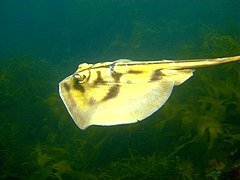Urolophus
|
Urolophus Temporal range: 56–0 Ma Eocene to present |
|
|---|---|
 |
|
| Urolophus cruciatus | |
| Scientific classification | |
| Kingdom: | Animalia |
| Phylum: | Chordata |
| Class: | Chondrichthyes |
| Order: | Myliobatiformes |
| Family: | Urolophidae |
| Genus: |
Urolophus J. P. Müller & Henle, 1837 |
| Type species | |
|
Raja cruciata Lacepède, 1804 |
|
Urolophus is a genus of round rays mostly native to the western Pacific Ocean and the Indian Ocean, though one species occurs in the Pacific waters of the Mexican coast. Müller and Henle erected Urolophus in an 1837 issue of Bericht Akademie der Wissenschaften zu Berlin. The name is derived from the Greek oura, meaning "tail", and lophos, meaning "crest". In Urolophus, the outer rims of the nostrils are not enlarged into lobes, but may form a small knob at the back.Raia (Leiobatus) Blainville, 1816 is a synonym of Urolophus; though his account was published earlier, none of species Blainville listed for Leiobatus had descriptions, thus rendering them invalid.Urolophus fossils have been recovered dating back to the Eocene epoch (c. 56–34 Ma).
There are currently 22 recognized species in this genus:
...
Wikipedia
